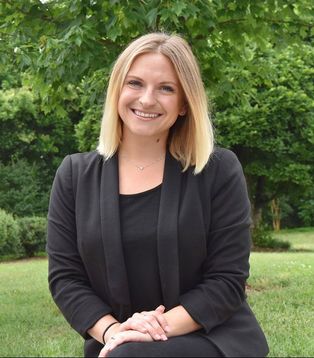 When you arrive at a Chamber event, there’s a good chance Keri Gloth will be the first person to smile and greet you. Keri is our events coordinator, making sure that the events that you attend run smoothly. She brings a wealth of experience in corporate event planning. Keri moved to Raleigh nearly three years ago, managing events at the Raleigh Marriott Crabtree Valley. She also managed corporate catering sales for City Barbecue. Keri is a graduate of Coastal Carolina University with a degree in communications and journalism. She and her husband love living in Raleigh with their two dogs, Zoey (a black lab) and Reece (a beagle mix). Keri says she is “obsessed” with our greenway system and is planning what will be her next marathon!
0 Comments
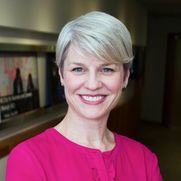 By Adrienne Cole President and CEO Greater Raleigh Chamber of Commerce Anyone buying or selling a home in the Raleigh area knows how hot the real estate market is. People want to call Wake County home. Businesses are moving here. The county’s population is growing by 67 people a day or about 470 per week. While affordable when benchmarked against other markets, we have seen house and rent prices on the rise. The average home price in Wake County is about $261,000. Now picture yourself living in the Pacific Northwest. Seattle and King County also are seeing tremendous growth. From 2011 – 2016, Seattle’s population has increased by more than 300,000 people, approximately 1,000 per week. Fueled by a thriving tech sector, natural beauty, and an innovative culture that has grown technology superstars like Microsoft, Amazon, and Tableau, Seattle has a lot to offer. Yet, if you want to call this community home, Seattle’s median home price is $819,000. Issues around density, affordability, zoning, and the squeezing of the middle class all threaten Seattle’s economic well-being. Seattle is a city built on a culture of innovation and disruption with a strong focus in technology, aviation/aerospace, and logistics with aspirations to grow in the areas of life sciences, clean tech, and advanced manufacturing, areas in which we are already strong. We can learn a lot from Seattle and that’s why we selected the city as our destination for this year’s Inter-City Visit and Leadership Conference. More than 150 business leaders and elected officials from our community joined me in Seattle on April 22 – 25 to see what ideas and lessons we could bring back to our community. This is the first in a series of posts I am writing to share my key takeaways from our trip.  Our visit to Seattle reemphasized to us the importance of leadership. Leadership is always the key to a city’s success. The decisions we make today impact the future of our community. To stay ahead of the growth that is expected in Raleigh and the region will require bold leadership and strong partnerships with business, government, and the nonprofit sectors. We need to decide now what we want to look like in the future. We learned in Seattle and from previous inter-city visits to other locations, including Austin and Boston, that delaying important investments and decisions only put those cities behind the eight-ball. Limiting density, transit-oriented development, and various housing options, and not investing in road infrastructure did not slow the growth. Playing catch up and spending more money to accommodate the growth was inevitable. For Raleigh, the consequences of inaction are too great. Raleigh and the Research Triangle region are growing and will continue to do so. We have a talented workforce, world-class universities, high quality of life, reasonable cost of doing business, and an innovative culture, along with strong tech, life science, and advanced manufacturing sectors. There is too much going for our region for us not to grow. We will continue to attract companies and people from around the world. That’s a good thing! A collaborative approach to plan for the growth and to make the tough decisions needed to grow in the right way will be essential. Let’s continue to talk about housing. Seattle is in a crisis because zoning laws have not kept up with the rapid growth of the region. To add more residential density, mixed-use buildings, or transit-oriented development would require zoning changes. After seeing Seattle and talking with its community leaders, we came away with the impression that the necessary changes are much harder to implement now than they would have been decades ago. What can we learn from this—we need to act now, make decisions earlier, and plan for future expansion. The time to address density and affordability in Wake County is now. Both of which factor into Seattle’s large homeless population. We do not want a situation where it costs too much to own a home in Raleigh or the region. Raleigh and Wake County both have proposed plans and funding to address affordable housing needs in our community and working with the business community will be essential. One clear takeaway from Seattle was that you need many different affordable housing options to meet the needs. We need to continue on the path toward ensuring that affordable housing and workforce housing are viable options for the people who want to live here in the years to come. A growing population also means a growing need for efficient transportation and transit infrastructure. I’ll explore what we learned in Seattle about that in my next post. 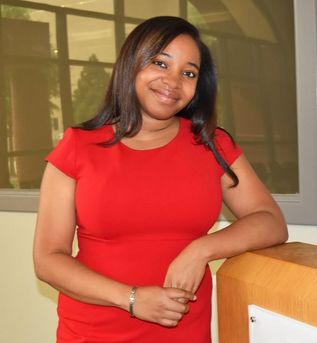 We are so glad to have Syreeta Hargrove join our team. As our government affairs manager, Syreeta advocates for our member businesses and ensures that Raleigh and Wake County sustain and develop a high quality of life. Syreeta is a North Carolina native, born and raised not too far away in Warren County. She has a communications degree from NC State and a master’s in public affairs from Western Carolina University. Prior to joining the Chamber, Syreeta worked at the U.S. Environmental Protection Agency in RTP in the Office of Science Information Management. She’s a big fan of adventure sports, including kayaking and paintball. Syreeta loves calling Raleigh home! Recruiting and retaining talent is a challenge that every business faces. To the greater Raleigh business community, it’s especially important to continue developing a strong, local talent pipeline. As those business leaders who attended “Workforce Development: High School Internships” found out, internships for high school students are a great way to strengthen that pipeline and enhance your company’s reputation within the community.
Several business leaders who have implemented successful high school internship programs spoke at the forum at Marbles Kids Museum on May 22. The forum comes on the heels of our regional skills analysis, which showed that while many Raleigh-area business leaders want to introduce high school students to their industries, few have plans in place to do so. Will Barfield, vice chair of education for the Greater Raleigh Chamber of Commerce Board of Directors, moderated the panel discussion. He was joined by Joy Frankoff, the school-to-career coordinator for the Wake County Public School System, Bret Batchelder, managing director of Cherokee Investment Partners LLC, Joy Bradley, employee engagement manager with Cisco, and Adrienne Reich, physical therapist and site coordinator of clinical education with the Raleigh Orthopaedic Clinic. “I connect business and industry with students and our teachers,” said Frankoff, speaking about her position with Wake County schools. “There are a number of reasons why high school internships are advantageous (for students). It allows a student to get a taste of what it’s like to work in that particular field.” She also discussed the advantages for businesses. “You get to have access to that talent pool early on,” said Frankoff. “You get to have an impact on that and there is a brand awareness.” Batchelder agreed. “It’s a way to give back to the community,” he said. “It’s also marketing and brand awareness.” Bradley added, “The students are seeing a whole world of work that they would not get to see otherwise.” She said that Cisco focuses a lot of attention on STEM (science, technology, engineering, and math) education. “We are selective about which high schools we approach,” said Bradley. “We focus on the area high schools that have the strongest STEM programs.” Frankoff told the audience that the size of the business does not matter when it comes to finding high school students the right internship. “The career development coordinator will match you with a student who has the right interests and skill set,” she said. “If you’re interested in that student, that student will be engaged.” Reich said that, at the Raleigh Orthopaedic Clinic, a lot of their employees want to teach students. “It’s about finding that internal champion,” she said. “Having someone who is able to talk to the students is very important to find out what their passions and skill sets are.” Bradley said that, at Cisco, they find it’s important to show the students the inner workings of what the company does and then give those students a capstone project at the conclusion of their internships. “These kids are brilliant,” she said. “They come forward with ideas that can change the way we think about certain projects.” Batchelder encouraged businesses who aren’t offering high school internships to consider starting a program. “It doesn’t have to be complicated,” he said. “You could do a summer-long internship or a two-week internship.” Frankoff said that, with Wake County schools, formal internships are for juniors and seniors. She explained that there also are other ways to introduce students to industries. “Job shadowing is for one day,” she said. “It could be a couple hours. It’s getting a feel for the work and for your organization. We also have short-term work experiences. That could be two weeks. Then, there is the internship, which is a minimum of 135 hours.” Addressing any perceived barriers that some business leaders feel may exist to offering high school internships, Frankoff said, “It’s not rocket science. It’s not hard. It’s giving that young person an opportunity to start their career journey.” Batchelder added, “These internships mean more to them than you’ll ever know.” Barfield concluded by encouraging business leaders to consider creating a high school internship program. “We cannot be passive recipients to what the labor market provides,” he said. “We need to be active.” We want to thank our panelists for taking part in such an insightful discussion. We also want to thank all of our sponsors who made the forum possible. Don’t forget to join us on May 29 for our Legislative Reception, also at Marbles! 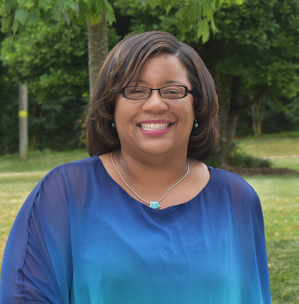 Alicia Miller, CMP, our senior manager of events, brings nearly 20 years of meeting planning experience to the Chamber. When you arrive at one of our events, Alicia likely will be one of the first smiling faces you’ll see. She answers your questions about registration and also plans the key details for our signature events. Alicia is originally from the Triangle and, after some time away, moved back here in 2011. She is having fun getting to know her home again! If you noticed the CMP behind her name, that’s because Alicia is a Certified Meeting Professional. She also is a proud graduate of UNC-Charlotte. At home, Alicia is mom to an energetic, bouncing two-year-old boy who is her heart and soul! Our Coffee with Leaders series returned May 15 and, this time, those in the audience got to hear from two presenters. Wake County Manager David Ellis and Wake County Economic Development Executive Director Michael Haley spent an hour updating and discussing city and county priorities.
“We have great opportunities here and I look forward to working with all of you,” opened Ellis. Less than a week after Ellis introduced his budget proposal, totaling a little more than $1.3 billion, he discussed the spending priorities in that proposal. The budget includes a 2.9-cent increase to the property tax rate. For a $300,000 home, that would add $87 to the tax bill yearly. Ellis said there needs to be an increased focus on housing affordability in our area. “We just don’t have enough homes being built on yearly basis to keep up with the number of folks moving here,” he said. Ellis called for a “historic” investment in housing, looking to build 500 affordable housing units a year. Among other topics in the proposed budget, he also spoke about education funding. “Wake County is committed to education,” said Ellis. “Education really sets the foundation for kids moving forward.” Ellis’ proposal calls for investing an additional $30 million for the Wake County Public School System this year, with per-pupil spending at $2,618. Haley spoke after Ellis and said his takeaway is that Wake County is committed to smart growth strategies. “As a community, we’re making strong investments today for a stronger tomorrow,” said Haley. He talked about the importance of investing in education. “Talent is what drives this community,” said Haley. “Education is the underpinning of our success.” Haley said Wake County Economic Development currently is working 51 active jobs, which he described as companies looking to expand or come to the market for a new growth opportunity. Potentially, that could mean nearly 15,000 jobs combined. “The demand for talent in this market is so strong,” said Haley. He said for every one new tech job in our marketplace, four other jobs are created. Both then opened up the floor for questions from the audience. One person who attended asked about their reflections on the recent Inter-City Visit and Leadership Conference to Seattle. “Seattle is not Raleigh,” said Ellis. “You need to plan smartly.” Ellis mentioned the homelessness issue facing Seattle. “You need to plan now and you need to plan smart,” said Haley. “You need to be able to partner at an intergovernmental level if you want to address broad problems.” Ellis said the county needs to partner with private companies and developers to solve the housing issue. Another audience member asked about transportation in our region. Joe Milazzo II, executive director of the Regional Transportation Alliance, a program of the Raleigh Chamber, was in the audience. He talked about transportation improvements that have happened and are continuing to happen. “In the last 17 years, we’ve added 50 miles of freeway,” Milazzo said. “In the next ten years, we’ll add 40 more miles of freeway.” He also talked about how four bus rapid transit lines all will be open in the next ten years and pointed to the new Union Station, where trains will begin stopping this month. Milazzo encouraged anyone who wants to learn more to visit www.letsgetmoving.org/forward. We want to thank Ellis and Haley for taking part in today’s discussion. We also want to thank our Series Sponsor, Duck Donuts. Our next Coffee with Leaders event will be with Eric Shander, executive vice president and chief financial officer with Red Hat, Inc. We’ll have more details about this event posted at a later date. Coffee with Leaders is an event that the Chamber hosts for businesses that have 50 employees or fewer. Transportation is something that impacts us all in one way or another. Whether it’s finding the best route to take or the best way to travel, getting around the Triangle is something we each think about daily.
The Regional Transportation Alliance business coalition, a regional program of the Raleigh Chamber, knows how significant transportation and transit are to Triangle businesses, both for day-to-day operations and in talent recruitment. The RTA Summit Series is a great way for business leaders to share their ideas for transportation improvements and learn from others about how they are impacted by existing mobility issues. The three-day series took place from May 1-3 at locations in Durham, Raleigh, and RTP. Series speakers included a lineup of RTA chairs and vice chairs. At the Raleigh session on May 2, hosted by Citrix, RTA Executive Director Joe Milazzo II opened the session by talking about recent transportation successes, including the allotment of $1 billion in new local funds for transit over the next 10 years, and 40 miles of new or enhanced freeway during that same timeframe. He also discussed how RDU has added 17 new nonstop destinations in the last five years alone. Keith McDonald, the site lead for Credit Suisse’s Raleigh operations team and RTA vice chair of rapid research, spoke with the audience about possible funding solutions for roadways, given the unstable source of the fuel tax. “If we want to maintain good, quality roads, how do we pay for it,” McDonald asked those in attendance. He talked about the potential of charging a network access fee to drivers who register their vehicles, as an alternative to the state gas tax. Maeve Gardner, manager of state government affairs with GlaxoSmithKline and RTA chair of legislation and policy, discussed with the audience the importance of finding new revenue-generating ideas to fund improvements at RDU International Airport. “RDU is a phenomenal asset to this community,” said Gardner. Then, Pete Marino, a partner with Smith Anderson Law Firm and RTA freeways chair, and Jim Beley, general manager of The Umstead Hotel and Spa and RTA chair of regional travel experience, opened the discussion on commuters’ overall travel experience in the Triangle. “Freeways are a critical part of mobility,” said Marino. “But freeways can sometimes create a barrier within a community.” He discussed how some cities are considering freeway caps, which could be a structure or a park that would, in essence, provide a large land bridge over the top of a freeway as an enhanced way to keep communities connected beyond traditional bridge crossing connections. Beley continued the discussion about the state of our roadways. “Our roads are the gateway to our area,” he said. “Sometimes that impression is not always what it could be, in terms of littering and the visibility of information. My business is tourism and travel, and I want the travelers coming in to our region to have the best experience.” He also suggested improved lighting at interchanges so that people would feel more comfortable driving at night. Next, those at the Summit Series focused on how to make transit more accessible to everyone. Richard Adams, senior vice president with Kimley-Horn and RTA vice chair of regional transit, and Brian Kubis, a senior financial analyst with Citrix and RTA vice chair of intercity higher speed rail, talked about the importance of making transit a more attractive option. Attendees made a variety of suggestions and observations throughout the session based on the various presentations from RTA volunteers. On transit, for example, some participants suggested improving the appearance of buses, as well as the frequency and utility of service, and incentivizing the first few trips to get people familiar with taking transit. Milazzo said the feedback from the three sessions would be compiled and RTA will put together a summary report on the series later this month, available at www.letsgetmoving.org/summitseries. Thank you to all of the members and partners of RTA who are investing in the future of our mobility! Anyone who has lived in the Raleigh area for any amount of time likely has heard about growth. Wake County grows by 67 people a day. This reflects the wonderful community in which we call home, but also presents challenges. How do cities encourage growth, but also accommodate it? How do you make sure that prosperity is equitable? These were the key themes of this year’s Economic Development Forum. The forum was indeed, “A Tale of Three Cities,” as we heard from Chamber leaders from three metropolitan Chambers (Indianapolis, Nashville, and Raleigh), each experiencing tremendous growth. More than 200 people attended the forum. As Michael Haley, executive director of Wake County Economic Development, put it at the outset of the forum, “This is a chance to look at how other communities handled growth and how they are addressing their own challenges. We’ll be able to share what we are doing and what we can learn from each other.” Haley first introduced Michael Huber, the president and CEO of the Indy Chamber in Indianapolis. “There has been explosive growth in Indianapolis since the 1970s,” he said. Huber pointed out that Indianapolis also is seeing growth in the poverty rate and inequality in the city. “What’s disturbing is that, if you were born poor, you are likely to stay poor,” said Huber. “The solutions are really complex. No one has the perfect five-point plan, so we need to learn from each other.” Huber said the closure of several major plants has impacted the income level of certain neighborhoods. He also referred to Raleigh when discussing higher education. “You have that cluster of research universities right here,” Huber said. “You are the envy of the country.” Those who attended the forum then heard from Courtney Ross, the chief economic development officer with the Nashville Area Chamber of Commerce. Ross said that the population of Nashville has grown 156 percent since 1990. “Sixty-six net new people are moving in each day,” she said. Ross then compared that number to the growth in Wake County and got smiles from the audience. “We’ll call it 67 and we’ll call it even,” she said. Ross said Nashville has been a top-10 metro in the U.S. for growth in the last ten years. “We are a healthcare town,” she said. “This is what drives us. But, we have got to compete with Raleigh on healthcare IT. We’ve got that next-tier advanced manufacturing and, of course, music and entertainment. We’re seeing more companies move to Nashville for that lower cost of living from New York and Los Angeles.” Ross also pointed out that Nashville’s poverty rate is growing. “We’re doing so great, but not everyone is benefiting from prosperity,” she said. Ross and Huber then were joined by Adrienne Cole, the president and CEO of the Raleigh Chamber, for a panel discussion. “We know we’ve got a lot going for us,” said Cole. “We’ve got an incredible education system. We heard in Seattle that we’re really getting a lot right.” She was referring to the recent Inter-City Visit and Leadership Conference where more than 150 business and elected leaders from the Raleigh area went to Seattle to learn about the growth that city experienced and the challenges it is facing. 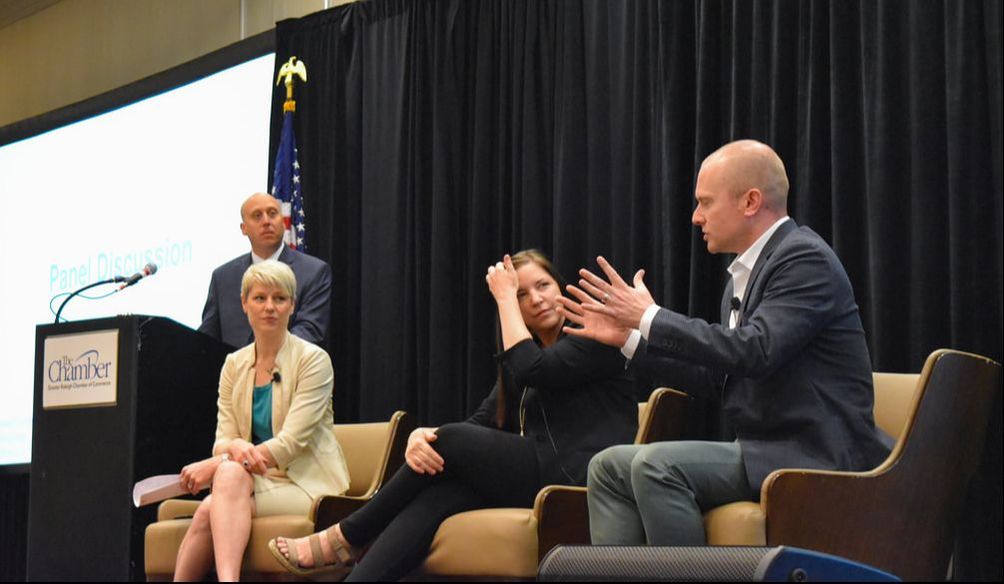 Cole said our area has a lot going for it right now, but she said the Chamber and its members are taking “an eyes-wide-open” approach to framing the future. She added that diverse teams are more profitable teams.Ross said, “Chambers bring people together. That’s what they do best. We bring people to the table to have the conversations to solve problems.” This issue remains a top priority for the Raleigh Chamber. Danya Perry, who joined Wake County Economic Development in January as the equitable economic development manager, also spoke at the forum. “Collectively, what can we do to start to remove some of the barriers for some of our communities,” he asked. Perry said he will be assessing community needs through a listening tour, identifying key partnerships, and creating program of work. “I’m going to be focused on inclusive economic mobility, small business and entrepreneurship support, and talent and workforce development,” said Perry. Audience members were engaged with Perry and the panelists. They also were active on social media. During the forum, the official hashtag, #EDForum18, was the top trending topic on Twitter in the Raleigh area. Thank you to everyone for participating and to our many sponsors for making the forum possible.  Beau is thrilled to join our communications team at the Chamber. He tells the story of all the wonderful things that are happening here. Beau helps us communicate to our membership, as well as to the public. If you feel as though you’ve seen Beau before, it was probably on the local news. Beau moved to Raleigh in 2007 and was a reporter for WRAL-TV for seven years. He then joined WNCN, where he was the political reporter for the next four years. Beau and his wife are proud to call Raleigh home and to know their son, born in 2017, will grow up in such a wonderful community. Photos by S.hughes Imaging and f8 Photo Studios The Women’s Leadership Conference has grown in popularity each year since we organized it five years ago. This year, we shattered our attendance record. More than 800 people came to the Raleigh Convention Center on May 3 for the half-day conference, learning about the importance of our theme, being Champions of Women. We also were so excited to see our Twitter hashtag for the conference, #RaleighWLC18, was the top trending topic in the Raleigh area for the day!
Keynote Address Throughout the conference, people heard messages that left them feeling inspired and empowered. Our keynote speaker, Carey Lohrenz, is the definition of inspiration. She was the first fully qualified female F-14 Tomcat pilot to fly in the U.S. Navy. Think Top Gun! She told the audience about the importance of handling stress in the cockpit. “Under stress, can you still be successful and adapt to different scenarios,” she asked the crowd. “If you lose sight, you lose the fight. When we start to try to do everything, we dilute our focus. When you dilute your focus, then you dilute your power. Focus on what matters.” Lohrenz delivered a message that determination is key, whether it be as a fighter pilot or in the office. She encouraged women that, when an opportunity arises, they should raise their hand, even if they don’t feel as though they are ready for the challenge. Often times, she said, they are. “When we’re afraid to fail, we end up passing up really good opportunities, simply because we’re afraid to fail,” said Lohrenz. “Don’t be afraid to push the limits. Don’t be afraid to fail.” She also talked importance the importance of performing well for the team. “Great teams embody two qualities: belief and trust,” said Lohrenz. “Your job is to make the person to the right of you and to the left of you look good.” She closed her keynote with one more message of inspiration. “You have the ability to write your own story but you have to show up,” said Lohrenz. Panel Discussion That wasn’t the only message of inspiration for those who attended this year’s conference. The conference opened with a panel discussion about women in the workplace and in higher education. On the panel was Farad Ali, president and CEO of The Institute, Leah Brown, president and CEO of A10 Solutions, and Margaret Spellings, president of the UNC System. Amber Rupinta, news anchor for ABC-11 Eyewitness News (WTVD), moderated the panel. Spellings talked about the importance of mentoring young leaders. “I love it,” she said. “It gives me insight into the struggles of those younger than me. You get as much as you give.” Brown said a call to action is needed to do more to champion women in the workplace. “Of all the Fortune 500 companies, only 24 have women CEO’s and none are African American,” she said. “What are we really doing to change things?” Ali said, “When you look at the top companies in North Carolina, there are only three with women leaders. There is a lack of equity. We need to create opportunities, not obstacles, to people’s success.” The panelists also talked about the importance and challenges of balancing life as a mother with a career. “We’re not going to get change until we have more mothers in higher levels of leadership,” said Brown. Spellings encouraged women to bring their children into their work life when they can. “Make it a family affair so they see the value of how you spend your time,” she said. Breakout Sessions Another key aspect of the women’s leadership conference are the five breakout sessions. Those who went to the conference got to pick which sessions they attended. One session was called, Building Your Own Brand. Audience members heard from four speakers, including Allison Conley and Emily Cutts, the co-owners of Parlor Blow Dry Bar, Rebecca Quinn-Wolf, vice president and director of client and community relations for PNC’s Eastern Carolinas market, and Dickens Sanchez, associate director of business development for Clean. “It started with us wanting to create a culture that was empowering to people,” said Cutts, talking about the formation of her company’s brand. “We knew we wanted to do something. Our personal brand started with what we wanted to give to the community.” Quinn-Wolf talked about the importance of core values at PNC. “We have a set of core values that are intertwined,” she said. “They are performance, customer service, respect, diversity and inclusion, teamwork, and quality of life.” Another session was called, Finding Your Strengths and the Strengths of Your Team. Those at this session heard from Jenn Mann, executive vice president and chief human resources officer with SAS Institute, Inc., Joy Ruhmann, president of Level Up Leadership, Inc., and Shelley Willingham, who leads Vision and Passion International, LLC. “If you’re not confident in your work, then you’re going to feel disillusioned,” said Ruhmann. “If somebody is not interacting with the team the way they need to, somebody in leadership needs to help them or be supportive of them making a transition outside the organization.” Mann also talked about the importance of employees having one-on-one meetings with leadership. Next door, there was a session called, Workplace Advocacy. Sexual harassment in the workplace has been a significant topic nationally. This session took a closer look at what companies and individuals need to know. Those who attended heard from Sarah Ford, an employment law partner and Title IX attorney with Parker Poe Adams & Bernstein LLP, and from Ursula Mead, the founder and CEO of InHerSight. “If sexual harassment is not addressed by an employer, there is a risk of quid pro quo,” said Ford. “There is clearly a lot of that still happening. It’s come to light in the entertainment and movie industry. There also is fear of retaliation.” In the next room was a session called, Why Championing Women is Good for Business. The panel included Kristy Dixon with KMD HR Solutions, LLC. She also is the former president of the McLaurin Parking Company. It also included Kelly Gruber, the inclusiveness and flexibility leader for the southeast region at Ernst & Young, LLP, and Ronnie West, the chief people officer at Ipreo. “We are seeing better market penetration when we see diverse teams,” said Gruber. “If you have better balance on your teams and women are involved, then you’re going to get to better innovation.” The final session was called, How Women and Men Communicate Differently at Work. It was led by Fred Hutchison, the founder of Hutchison PLLC, and Beth Ritter, an associate professor of practice in management, innovation, and entrepreneurship at the Poole College of Management at NC State. Hutchison said studies have shown men take more risk going for bigger wins, even though the wins are less likely and more costly. Ritter said women are better at reading people’s body language. She also told the audience not to undersell their knowledge by calling it intuition. Thank You to Our Sponsors The Women’s Leadership Conference was a huge success! We could not have done it without our sponsors and are so thankful for their support. We can’t wait to start planning WLC 2019! |
AuthorGreater Raleigh Chamber of Commerce Archives
July 2024
Categories
All
|
|
Greater Raleigh Chamber of Commerce
800 S. Salisbury St. Raleigh, NC 27601 |


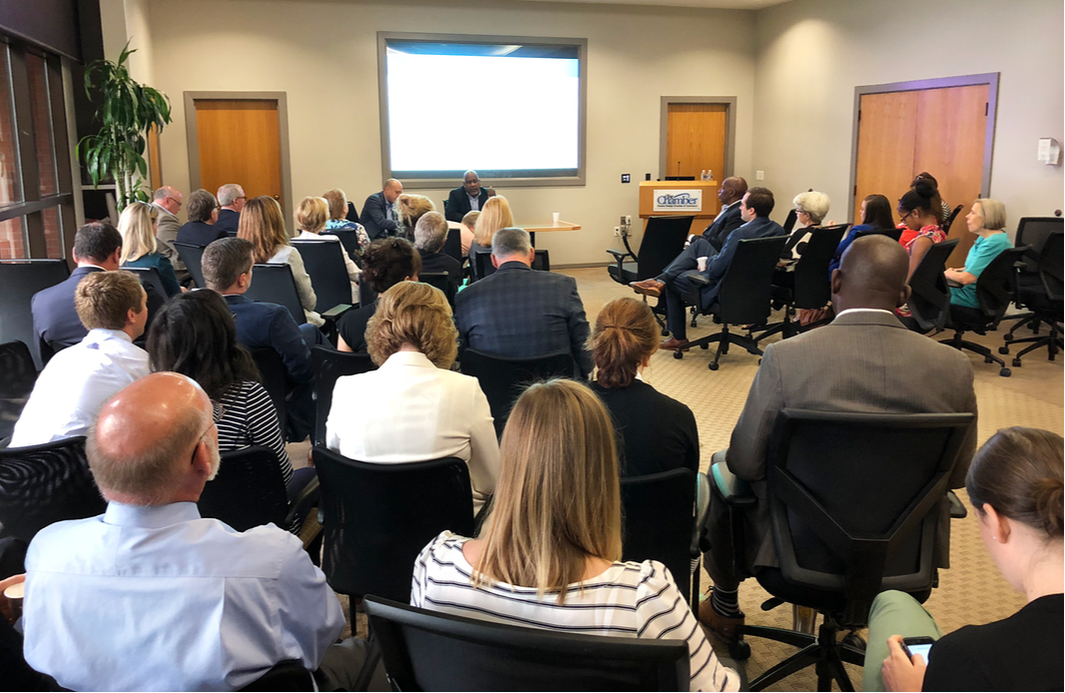
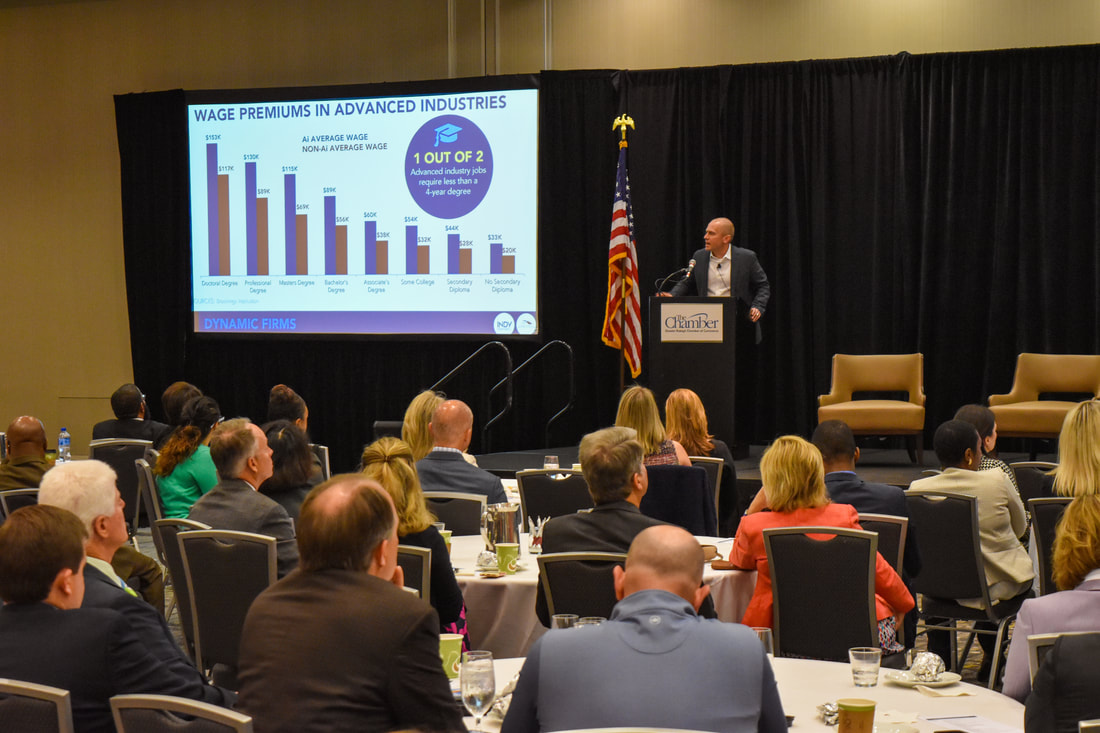
 RSS Feed
RSS Feed